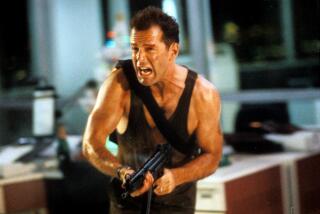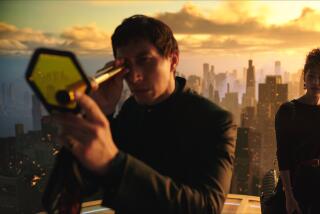Debonair Actor Joseph Cotten Dies at 88 : Movies: Performer began his film career in the 1941 classic ‘Citizen Kane.’ He remained durable throughout, making nearly 60 motion pictures.
Joseph Cotten, the enduring, elegant actor whose four decades in movies began at the pinnacle of film lore with the classic “Citizen Kane” and ended less memorably with the stunning flop “Heaven’s Gate,” died Sunday. He was 88.
Cotten died of pneumonia at his Los Angeles home, said his business manager and lawyer, Hugh Robertson. Cotten’s wife, actress Patricia Medina, was with him when he died.
The actor had suffered a debilitating stroke and heart attack in 1981, and fought for years to regain use of his well-known gravelly baritone voice. Troubled intermittently by throat nodules, he had his larynx removed in 1990 because of cancer.
Cotten’s earliest films were regarded as his best and his best-known, beginning with “Citizen Kane,” Orson Welles’ thinly veiled biography of William Randolph Hearst in 1941, in which Cotten played Kane’s elderly best friend Jedediah Leland. To follow in the 1940s were memorable roles in “The Magnificent Ambersons,” “Shadow of a Doubt,” and “Portrait of Jenny” for which he won the 1950 Venice Film Festival prize for best actor. In 1950, he rejoined Welles the actor in the highly successful international thriller “The Third Man.”
“Mine was a heady beginning in the movies,” Cotten wrote with understatement in his poorly received 1987 autobiography, “Joseph Cotten: Vanity Will Get You Somewhere.” “We made a classic without knowing it.”
At the other end of his film career, he realized a lifelong thrill in “Heaven’s Gate”--opening at Radio City Music Hall. But the irony of the failed film in 1982 was not lost on him, as he wrote in his book: “It was such a disaster that it closed the Music Hall.”
But the dapper, debonair Cotten remained durable throughout, always finding work to support his robust appetites for clothes, travel, women, parties and elaborate homes in London, Los Angeles or Palm Springs.
“The persisting core of Cotten’s work has been an elegant and unobtrusive craftsmanship which emphasized the role that Cotten was playing rather than the fact that Cotten was playing it,” Los Angeles Times critic Charles Champlin said at the time Cotten’s book appeared. “Not often has an important Hollywood personality of Cotten’s generation been so deferential to the material itself.
“In a tradition more British than American,” Champlin wrote, “he has been the working actor: Have tux, will travel. He has done everything, from ‘Petulia’ to ‘The Abominable Dr. Phibes,’ occasionally lending his particular dignity to some very thin texts indeed.”
Cotten acted well with, and for, his young friend Welles, and even scripted their “Journey Into Fear” in 1942. His 1936 stage success in “Horse Eats Hat” with Welles for the Federal Theatre Project and his stage triumphs in Welles’ Mercury Theater propelled Cotten’s career.
Needless to say, Cotten was nonplussed when Welles offered this early appraisal:
“You’re very lucky to be tall and thin and have curly hair. You can also move about the stage without running into the furniture. But these are fringe assets, and I’m afraid you’ll never make it as an actor.
“But as a star,” Welles added, rekindling Cotten’s sinking hopes for his future, “I think you well might hit the jackpot.”
Born in the Virginia peanut center of Petersburg on May 15, 1905, “Jo” Cotten got his first job working for his father, the city superintendent of mails, distributing special delivery mail by bicycle.
“I had the best pair of legs in the world,” Cotten often recalled. “I pedaled a million miles if I pedaled a yard.”
He did his first acting in high school, and after dropping out, set out to become an actor. He borrowed $150 from a banker uncle and went to Washington, D.C., to study for a year at the Robert Nugent Hickman School of Expression.
“Mr. Hickman’s voice lessons were valuable,” he later wrote. “Beyond that, I learned that private acting instruction should be prohibited by law. . . . It is the audience who teaches (an actor) to act, and that can take place only in a theatre.”
To support himself in Washington, Cotten sold vacuum cleaners, and on Sundays played semiprofessional football, earning $25 a period, and losing most of it playing craps.
He later went to New York, where he found work in a paint warehouse but failed to launch a theatrical career.
“Without the natural physical endurance of youth, with its blessed ignorance, its lofty arrogance and vanity strong enough to be mistaken for graciousness,” he wrote decades later, “all actors would end their careers early.”
Lured to Miami by a real estate boom in 1925, Cotten got a job as an advertising salesman for the Miami Herald at $35 a week, which allowed him evenings free to work in the Miami Civic Theatre. A lifelong epicure who enjoyed cooking as well as ordering from menus, he concocted the mayonnaise for something called Tip Top Potato Salad and marketed it, an enterprise that failed only when health authorities put him out of business for lack of a license.
After five years in the Miami Civic Theatre, in which he unabashedly reviewed for the Herald plays in which he starred, a patron offered him a letter of introduction that sent him back to New York. He got theater impresario David Belasco to hire him as an assistant stage manager, and, while knocking on stars’ doors to announce “Five minutes please,” understudied Melvyn Douglas in “Tonight or Never.”
Cotten did the role for Boston’s Copley Theatre, where he stayed a season honing his craft in 30 plays. He also persuaded Lenore La Mont, a divorcee he had met in Miami, to come to Boston to play piano for the troupe. Cotten married La Mont, who had a small daughter, in Boston in the fall of 1931.
Back in New York and out of work again as the Depression set in, Cotten turned to modeling and acting in one-reel industrial films. He flunked intermittent screen tests but then met Welles at a radio audition. The two became fast friends when they were thrown out of a studio for laughing loudly at an actor’s mistake.
When Welles went into the National Theatre Project, a Depression-era project for out-of-work theatrical people, Cotten followed. And when Welles and John Houseman set up their Mercury Theater in 1937 with the play “Julius Caesar,” Cotten won an important role.
After two years with Mercury Theatre, and shortly before the radio version of Welles’ group made history with “War of the Worlds,” Cotten was cast opposite Katharine Hepburn in her stage triumph “The Philadelphia Story.”
When that tour ended in 1940, Cary Grant got the role as leading man in the film version, but Cotten decided to try Hollywood anyway. He called Welles and soon found himself with a leading part in “Citizen Kane.”
Cotten noted in his autobiography that for his film debut in a role many regard as the capstone as well as the wellspring of his career, he had to start filming with one day’s notice. He got the final script at 7 p.m. and reported nine hours later for extensive makeup, at 4 a.m.
Like Welles and anyone else with anything to do with “Citizen Kane,” Cotten incurred the enduring wrath of newspaper magnate Hearst. Even when “Joseph Cotten” appeared above the title in subsequent films, the actor noted, Hearst papers reviewed the films without mentioning his name.
The Mercury company broke up after “The Magnificent Ambersons” and “Journey Into Fear,” both in 1942. The next year, Cotten made “Shadow of a Doubt,” his favorite, and his first film for the independent producer David O. Selznick, who became an even stronger friend and supporter than Welles.
“Driving home from David’s parties required no headlights,” the bon vivant Cotten wrote with delight. “The sun had always risen.”
In addition to films, Cotten during the 1940s did a weekly Sunday CBS radio show called “Ceiling Zero” for Lockheed Aircraft.
Cotten’s first marriage suffered from his wife’s claustrophobia and fear of traveling, as his career took him to locations throughout the United States and Europe.
“I became unfaithful,” he related in his generally saccharine autobiography. “It was very easy. I was a young, healthy, full-blooded American and had achieved a certain amount of fame, which, of course, made it easier.
“I was an actor. A roamer. A lover,” he wrote. “I made pictures, I made love and I made martinis.”
His philandering caused Lenore to attempt suicide at one point when she had sailed to join him in England during filming of “Under Capricorn,” one of his two films for Alfred Hitchcock, which was released in 1949. She recovered, and Cotten, he later wrote, “discovered the true meaning of fidelity.” She later died of leukemia in Rome when Cotten was working on the 1960 film “The Angel Wore Red.”
After his wife’s death, Cotten directed a play at the La Jolla Playhouse, and then retired to his garden to mourn. Among his callers was the actress Patricia Medina, who had been a friend of his wife’s as well. He married her on the Selznicks’ terrace in the fall of 1960.
Sharing his love of travel and conviviality, Medina performed in many touring plays and some films with Cotten, but generally subordinated her career to his.
They performed together in “Calculated Risk,” which hit Broadway in 1962, just as the newspapers went on strike, preventing publication of the original review. Resurrecting his advertising expertise, Cotten set out to publicize the production on television commercials for soap or beer, always demanding his pay in air time to tout the play.
It was the first time his name had appeared above the title on a Broadway marquee, he explained, and he was simply “too vain to close.”
Cotten continued to make movies in the 1960s and ‘70s, totaling nearly 60 films during his long career. Later forgettable films ranged from “The Last Sunset” to the Japanese “Latitude Zero” to “The Abominable Dr. Phibes.” He had a cameo role in “Airport ‘77” and even happily appeared on television’s “The Love Boat.”
“I was in a lot of junk,” he candidly told an interviewer in 1987.
“Everyone,” he reflected matter-of-factly in his book, “flirts now and then with a little trash.”
“I didn’t care about the movies, really,” he said in his 80s. “I was tall. I had curly hair. I could talk. It was easy to do.”
More to Read
Only good movies
Get the Indie Focus newsletter, Mark Olsen's weekly guide to the world of cinema.
You may occasionally receive promotional content from the Los Angeles Times.










